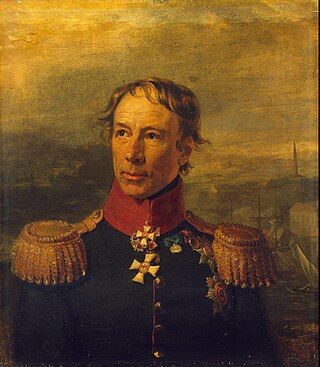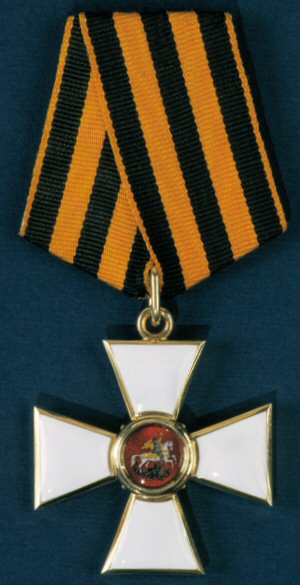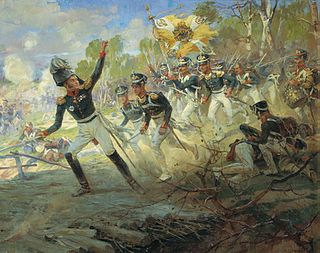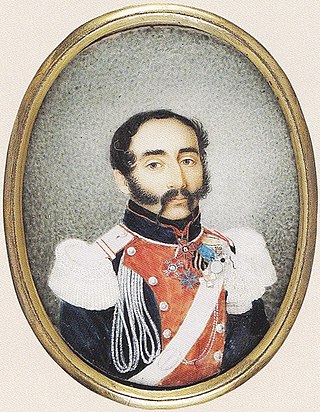
Prince Pyotr Ivanovich Bagration was a Russian general and prince of Georgian origin, prominent during the Napoleonic Wars.

The Battle of Borodino took place near the village of Borodino on 7 September [O.S. 26 August] 1812 during Napoleon's invasion of Russia. The Grande Armée won the battle against the Imperial Russian Army, but failed to gain a decisive victory and suffered tremendous losses. Napoleon fought against General Mikhail Kutuzov, whom the Emperor Alexander I of Russia had appointed to replace Barclay de Tolly on 29 August [O.S. 17 August] 1812 after the Battle of Smolensk. After the Battle of Borodino, Napoleon remained on the battlefield with his army; the Imperial Russian forces retreated in an orderly fashion southwards. Because the Imperial Russian army had severely weakened the Grande Armée, they allowed the French occupation of Moscow, using the city as bait to trap Napoleon and his men. The failure of the Grande Armée to completely destroy the Imperial Russian army, in particular Napoleon's reluctance to deploy his Imperial Guard, has been widely criticised by historians as a huge blunder, as it allowed the Imperial Russian army to continue its retreat into territory increasingly hostile to the French. Approximately a quarter of a million soldiers were involved in the battle, and it was the bloodiest single day of the Napoleonic Wars.

Prince Michael Andreas Barclay de Tolly was an Imperial Russian soldier of Baltic German and Scottish origin, who was commander-in-chief and Minister of War of the Russian Empire during Napoleon's invasion in 1812 and the War of the Sixth Coalition. Barclay de Tolly, while serving as the minister of war in Russia, was responsible for the country's defense against Napoleon's invasion in June 1812. He held this position until the following year. During the invasion, Barclay de Tolly led one of the Russian armies and fought in battles at Ostrovno and Smolensk. He also took up a military role supporting Field Marshal Mikhail Kutuzov, who was leading the army in retreat from Napoleon's advance. Despite facing opposition from senior officers and public calls for his removal, Barclay de Tolly persevered under great stress. He distinguished himself in the Battle of Borodino on 7 September and helped the Russian forces withdraw strategically to save what remained of their troops. However, he was forced to leave the army in October 1812. Barclay implemented a number of reforms during this time that improved supply system in the army, doubled the number of army troops, and implemented new combat training principles. He is among the greatest military commanders in the Russian service of all time.

Prince Mikhail Illarionovich Golenishchev-Kutuzov-Smolensky was a Field Marshal of the Russian Empire. He served as a military officer and a diplomat under the reign of three Romanov monarchs: Empress Catherine II, and Emperors Paul I and Alexander I. Kutuzov was shot in the head twice while fighting the Turks and survived the serious injuries seemingly against all odds. He defeated Napoleon as commander-in-chief using attrition warfare in the Patriotic war of 1812. Alexander I, the incumbent Tsar during Napoleon's invasion, would write that he would be remembered amongst Europe's most famous commanders and that Russia would never forget his worthiness.

Fabian Gotthard von Steinheil was a Baltic German who served as a Russian military officer and the Governor-General of Finland between 1810 and 1824.

The Order of Saint George is the highest military decoration of the Russian Federation. It was originally established on 26 November 1769 Julian as the highest military decoration of the Russian Empire for commissioned officers and generals by Empress Catherine the Great. After the October Revolution in 1917, it was awarded by the White movement under Alexander Kolchak until their collapse in 1921. The order was revived in the Russian Federation on 20 March 1992 by Decree №1463 of the President of Russia. The current award criteria were amended on 7 September 2010 by Presidential Decree 1099.

The Battle of Smolensk was the first major battle of the French invasion of Russia. It took place on 16–18 August 1812 and involved about 45,000 men of the Grande Armée under Emperor Napoleon I against about 30,000 Russian troops under General Barclay de Tolly. Napoleon occupied Smolensk by driving out Prince Pyotr Bagration's Second Army. The French artillery bombardment burned the city to the ground. Of 2,250 buildings, 84% were destroyed with only 350 surviving intact. Of the city's 15,000 inhabitants, about 1,000 were left at the end of the battle inside the smoking ruins. With over 15,000 casualties, it was one of the bloodiest battles of the invasion.

The Preobrazhensky Life-Guards Regiment was a regiment of the Imperial Guard of the Imperial Russian Army from 1683 to 1917.

The battle of Saltanovka, also known as the Battle of Mogilev, took place on 23 July 1812 and was a battle during the early stages of the 1812 French invasion of Russia.

Alexander Mikhailovich Rimsky-Korsakov was a Russian general remembered as an unlucky assistant to Alexander Suvorov during his Swiss expedition of 1799–1800.

Prince Alexander Ivanovich Chernyshov, General of Cavalry (1827), was a Russian military leader, diplomat and statesman, whose career began in the Napoleonic Wars. After the Battle of Austerlitz (1805), he carried out successful diplomatic missions to France and Sweden and served with distinction in battles of 1812 and 1813. Chernyshyov rose through the ranks to the role of Russian Minister of War (1827–1852), chairman of the State Council and Cabinet of Ministers (1848–1856), and acquired the styles from Count (1826) to Serene Prince (1849).

The Imperial Russian Army was the armed land force of the Russian Empire, active from around 1721 to the Russian Revolution of 1917. In the early 1850s, the Russian Army consisted of more than 900,000 regular soldiers and nearly 250,000 irregulars.

Ministry of War of the Russian Empire, was an administrative body in the Russian Empire from 1802 to 1917.
The Second Western Army was created during 1810 as part of the reform of the Imperial Russian Army as a whole and was intended to defend the central western region of the Russian border with Poland to the Austrian border during the expected French invasion of Russia.

The French invasion of Russia, also known as Russian campaign and in Russia as the Patriotic War of 1812, was launched by Napoleon to force the Russian Empire back into the continental blockade of the United Kingdom. Napoleon's invasion of Russia is one of the best studied military campaigns in history and is listed among the most lethal military operations in world history. It is characterized by the massive toll on human life: in less than six months nearly a million soldiers and civilians died.

Alexander I, nicknamed "the Blessed", was Emperor of Russia from 1801, the first king of Congress Poland from 1815, and the grand duke of Finland from 1809 to his death in 1825. He was the eldest son of Emperor Paul I and Sophie Dorothea of Württemberg.

This is the order of battle of the French invasion of Russia.

The Barclay de Tolly is the name of a Baltic German noble family of Scottish origin. During the time of the Revolution of 1688 in Britain, the family migrated to Swedish Livonia from Towy (Towie) in Aberdeenshire. Its subsequent generations became a German-speaking family in Livonia, which became part of the Russian Empire after the 1700–1721 Great Northern War.

Alexander Nikolayevich Chechenskiy was a Russian major general in the Russian imperial cavalry of Chechen descent. He participated in the War of the Fourth Coalition and Patriotic War of 1812 among many other conflicts.

















